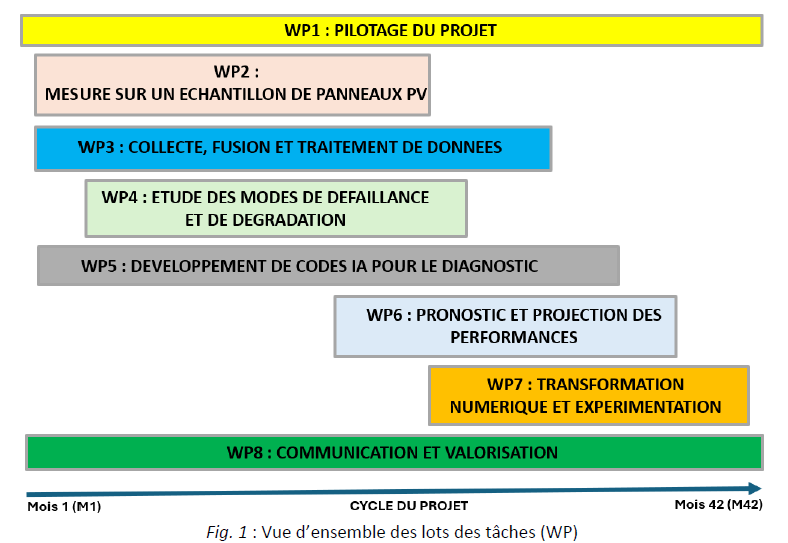- Index
- >Projects
- >Projects in progress
- >DIA-SOLAIRE
DIA-SOLAIRE Research Project
Intelligent diagnostic and prognostic tools for photovoltaic plant operation
Group : Reliability Engineering and Decision-Making tools
Labelling: none
Duration: 42 months, scientific work start date: 01/02/2025
Funding: DGAC
Staff involved from LARIS: Abdérafi CHARKI (Coordinator), Nizar CHATTI, Xavier SIDAMBAROMPOULE, Thierry LEMEAND, Marie-Lise PANNIER, Sylvain VERRON, David BIGAUD, Laurent SAINTIS, Oumayma MABROUK (PhD student)
Project partners: Centre d’Études et de Recherche en Thermique, Environnement et Systèmes (CERTES) : Pierre-Olivier LOGERAIS, Mahamadou Abdou TANKARI, Ali KHOUZAM, Olivier RIOU, Fabien DELALEUX, Jura ARKHANGELSKI, 1 Engineer to be recruited and the Laboratoire d’Économie et de Management Nantes Atlantique (LEMNA) : Barbara LYONNET, Marc BIDAN, Maelise PRESSE (PhD student)
Objectives
The DIA-SOLAIRE project aims to develop integrated diagnostic and prognostic approaches dedicated to existing and future photovoltaic (PV) power plants. These approaches will be hybrid, integrating both physical and data-based models, while exploring the potential of statistical and learning methods, particularly deep and transfer learning. The aim is to extend the average lifespan of PV power plants and optimize the management of their energy performance, while taking into account technological, human and environmental factors of influence, over the medium and long term, in a context of climate change.
Methodology
The DIA-SOLAIRE project will be structured around 8 work packages (WPs), the titles of which are shown in Fig. 1. In WP1, a steering committee (CoPil) will be set up; planning, quality and project risk management tools will be used throughout the project life cycle. WP2 will involve setting up instrumentation to characterize a sample of PV panels that have failed or are in degraded operation. WP3 will be aimed at formatting and processing metrological, meteorological and production data from PV plants, as well as qualitative data relating to the practices of PV plant operators. Two laboratories involved in this project have established partnership agreements with several industrial operators of large-scale PV power plants. As a result, the partners have access to a vast amount of data, including maintenance data and data measured at several geographical sites where PV power plants are installed. In WP4, the aim will be to establish a base of fault signatures and knowledge of the effect of failures and degradations on PV module performance. The influence of failure and degradation modes on the energy performance of PV power plants will be investigated using data-driven models. Location and conditions of installation and use, as well as environmental stress levels and profiles (relative humidity, UV exposure, temperature, etc.) will be considered. WP5 will involve the development of AI codes to identify, based on all the data established and collected in the previous WPs, the reduction in electrical signals observed, the failures and degradations that appear, and to link these with the production variations, particularly seasonal, of the sub-fields of a PV power plant in order to draw up, using a Machine Learning method, a map of its state of health in real time. In WP6, the aim will be to study the evolution of performance indicators in real time, to establish, using an AI method, a link between drifts and their causes, and to forecast the performance of a PV power plant. Then, by introducing economic laws (investments, evolution of energy costs, yields and prices of emerging technologies, life cycle...), the AI tools will make it possible to estimate the performance and profitability of a PV power plant. The tools developed in this project will be used to detect faults, diagnose and monitor production drifts in a PV power plant. They will be tested to diagnose and predict the state of health of a PV plant, and will be validated in the field to measure the applicability of the tools and provide support to users and operators. In WP7, we will be looking at the changes in maintenance practices that would result from the deployment of the tools developed, which will be tested “in situ” with PV plant operators: organization of maintenance plans, training, communication, determination of cleaning frequency, replacement of under-performing sub-fields with advanced-generation PV panels. Lastly, WP8 will be entirely dedicated to promoting the project's results, with eco-responsible and sustainable communication actions through publications, conferences, workshops and seminars, in accordance with the rules (ethics, scientific integrity, etc.) laid down in the consortium agreement. A technology transfer study of the AI tools developed for industry will be carried out with the support of the SATT (Ouest-Valorisation).



